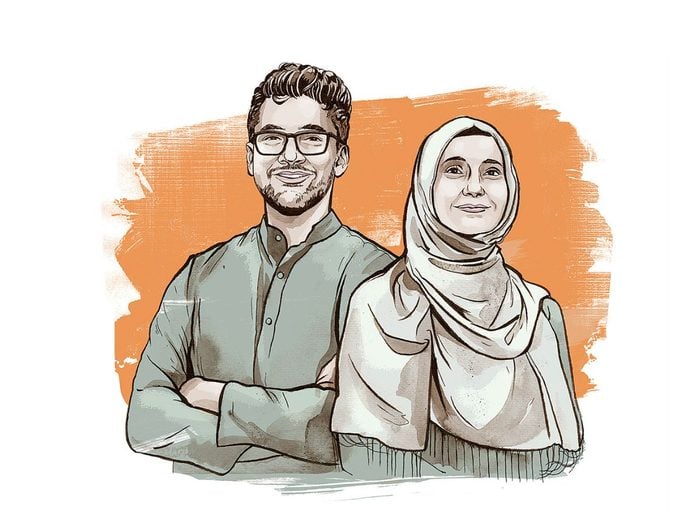This Free App Helps Muslims Access Better Mental Health Care

Ruh bridges psychology and faith to make mental health care more accessible for Muslims
Some people baked bread in response to the toll COVID took on their mental health. Others tamed their tedium by turning to TikTok—and the spontaneous shopping hauls the app encouraged. Omar Khan and Humeyra Nur Celebi developed the Ruh app.
Ruh (pronounced ‘rooh’) aims to improve the mental and spiritual health of Muslim users. The app, which launched in the summer of 2022, offers guided contemplation exercises—Khan prefers this term over meditation—that incorporate Islamic elements and practices, like du’a (prayer), dhikr (remembrance of Allah) and Qur’an verses. For example, one exercise invites listeners to reflect on Surah Al-Fatihah, the first chapter of the Qur’an, which is a reminder of the mercy, compassion and omnipresence of Allah.
The app was inspired by Khan’s experience seeking mental health care during the pandemic. Lockdown-induced isolation gave Khan, Ruh’s CEO, “a lot of mental health challenges.” He turned to existing mindfulness apps—like Calm and Headspace—but they didn’t resonate with him. “All the apps on the App Store and Google Play were primarily secular or Buddhist in nature,” says Khan. So he, Celebi and product advisor Uzayr Siddiqui began working on an alternative. Khan found that there were a lot of Muslim people who were seeking mental health care that was sensitive to their faith and culture. “There’s a whole group of people that excluded themselves from the benefits of mindfulness,” he says, “because they associated being mindful with their faith and they couldn’t find something that connects the two.”
The word “ruh” means “spirit” or “soul” and originates from Arabic. “A lot of times in the Western context, we talk about the mind, we talk about the body. The soul element is sometimes missing, and spirituality is sometimes missing,” says Khan. “We wanted to bring that back into the picture.”
The Mindful Prayer exercise, for example, encourages the listener to approach prayer as a blessed opportunity to disconnect from the world and its worries, instead of a burdensome task to check off their to-do lists. It’s led by Imam Yasin Dwyer, the lead chaplain and executive director of the Muslim Chaplaincy of Toronto, who’s an advisor at Ruh and narrates many of the app’s contemplations.
The feedback to Ruh has been phenomenal, says Khan. “People try the app and they say that just a couple of sessions makes them feel a renewed sense of purpose. We recently had a session geared toward mothers experiencing burnout; some of the moms listened to it and they said that they teared up.”
The app is completely free. It includes 15 guided contemplations—with more on the way—and has grown to reach more than 15,000 users across more than 30 countries, mostly through word of mouth. The app also includes Ruh Care, a global directory of Muslim mental health professionals, and a newly launched online therapy platform. Both users and therapists have shared how useful the app is for connecting with each other, which is key considering the well-documented difficulties Muslims across North America often face addressing their mental health needs. Barriers such as cultural attitudes, financial and physical accessibility and a dearth of cultural and faith-sensitive care can make seeking out mental health care daunting. But things are changing, Khan says, and he is excited about the role Ruh can play.
“I feel a lot more fulfilled [creating Ruh] than just doing a regular corporate job,” he says—though it did not come without challenges. Somewhat ironically, Khan experienced a lot of self-doubt and stress while working on the mindfulness app. “But when I hear people benefiting from the app and sharing their experiences with us…it keeps me driven to do even more and give back even more.”
Next: How These Urdu Language Books for Kids Enhance Connection, Cognition and Mental Health




